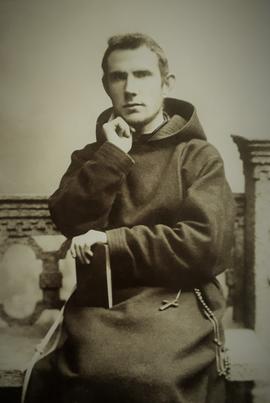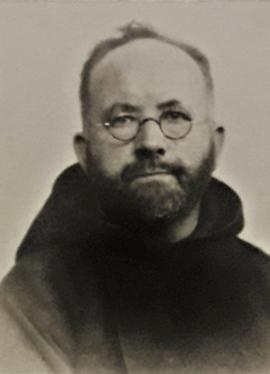Baptismal name: Thomas Hynes
Religious name: Fr. Jarlath Hynes OFM Cap.
Date of birth: 21 Dec. 1867
Place of birth: Mountbellew, County Galway
Name of father: Michael Hynes (Baker)
Name of mother: Mary Hynes (née Ryan/Rogan)
Date of reception into the Capuchin Order: 8 Dec. 1886
Date of first profession: 8 Jan. 1888
Date of final profession: 21 Feb. 1891
Date of ordination (as priest): 13 Dec. 1891
Leadership positions: Provincial Definitor (Councillor): 1898-1901; 1901-4; 1907-10
Date of death: 25 Mar. 1918
Place of death: Barrowville, County Carlow (He was a member of the Church Street community in Dublin at the time of his death).
Baptismal name: John Knaresboro
Religious name: Fr. Patrick Knaresboro OSFC
Date of birth: 1833
Place of birth: Inch, County Kilkenny
Date of reception into the Capuchin Order: c.1850
Ministries: He began his missionary work in India in 1859 ministering to Catholic soldiers and civilians in Shimla (Simla), Chakrata and Dagshai.
Date of death: 3 Nov. 1901
Place of death: Dagshai, Himachal Pradesh, India
Baptismal name: John Butler
Religious name: Br. Colman Butler OFM Cap.
Date of birth: 28 Feb. 1890
Place of birth: Kilgreana, Rosslee, County Mayo
Name of father: Edward Butler (Farmer)
Name of mother: Margaret Butler (née Flannery)
Date of reception into the Capuchin Order: 17 Dec. 1922
Date of first profession: 10 Feb. 1924
Date of final profession: 10 Feb. 1927
Date of death: 1 Dec. 1958
Place of death: Kilkenny County Hospital (now St. Luke’s General Hospital)
Place of burial: Foulkstown Cemetery, County Kilkenny
Patrick John Cox was born in Dublin on St. Patrick’s Day (17 March) in 1917. He entered the Capuchin novitiate in Kilkenny in July 1938 and took Xavier as his religious name. He was solemnly professed as a friar in 1942. Soon after his final profession, he volunteered for missionary work in the Prefecture of Victoria Falls in Northern Rhodesia (now Zambia). He left Ireland in late 1943 and undertook the difficult journey to Africa at the height of the Second World War. He arrived in Northern Rhodesia in January 1944. He spent twenty years working at the Sancta Maria mission station in Lukulu in the Western Province of Zambia. He also assisted in the building of a church and adjoining friary at the Saint Martin de Porres mission in Kaoma in 1968. A cancer diagnosis forced him to travel to Cape Town in South Africa to seek medical treatment in the early 1980s. He died in Cape Town on 2 December 1984 and was buried in the Capuchin plot in Maitland Cemetery.
Baptismal name: Patrick John Cox
Religious name: Br. Xavier Cox OFM Cap.
Date of birth: 17 March 1917
Place of birth: Dublin
Name of father: Christopher Cox (Provisioner’s Assistant)
Name of mother: Margaret Mary Cox (née Costello)
Date of reception into the Capuchin Order: 20 July 1938
Date of first profession: 21 July 1939
Date of final profession: 21 July 1942
Missionary activities: Travelled to Northern Rhodesia on 12 Nov. 1943
Date of death: Cape Town, South Africa
Place of burial: Maitland Cemetery, Cape Town, South Africa
Denis Corkery was born in Ballyvourney in County Cork on 6 April 1914. He received his early education in Ballyvourney National School and subsequently, attended Rochestown Seraphic College (1929-32) in County Cork. He was received into the Capuchin Order in October 1932 and took Fiacre as his religious name. He made his solemn profession on 4 October 1936 and was ordained to the priesthood on 14 June 1942. He obtained a Bachelor of Arts from University College Cork (UCC) in 1936 and graduated with a Master of Arts in 1937. Four years of theological studies followed in Ard Mhuire Friary in County Donegal, after which he returned to UCC to obtain a Doctorate in Philosophy in 1944. He then went to the International Capuchin College in Rome and studied at the Pontifical Gregorian University where he received a Licentiate of Sacred Theology (STL) in 1947. On his return to Ireland, he was appointed a lector in theology in Ard Mhuire. He spent three years in the Church Street community in Dublin from 1958 to 1961 after which he was transferred to the Capuchin house in Raheny where he spent the remainder of his life. During this time, he was engaged in pastoral work giving retreats and missions (especially retreats to religious), hearing confessions, preaching and general friary duty. Fluent in both Irish and French, he contributed several articles to various publications and was a frequent contributor to ‘The Father Mathew Record’ (later ‘Eirigh’). He died in Raheny on 15 November 1997 and was buried in the Capuchin plot in Glasnevin Cemetery.
Baptismal name: Denis Corkery
Religious name: Fr. Fiacre Corkery OFM Cap. (he reverted to his baptismal following the Second Vatican Council)
Date of birth: 6 Apr. 1914
Place of birth: Toonlane, Ballyvourney, County Cork (Diocese of Cloyne)
Name of father: John Corkery (Farmer)
Name of mother: Brigid Corkery (née Vaughan)
Date of reception into the Capuchin Order: 3 Oct. 1932
Date of first profession: 4 Oct. 1933
Date of final profession: 4 Oct. 1936
Date of ordination (as priest): 14 June 1942
Educational attainments: BA, 1st class hons. (1936); MA, NUI (1937); PhD (1944); Licentiate of Sacred Theology (STL), Rome (1947)
Date of death: 15 Nov. 1997
Place of death: Raheny, County Dublin
Place of burial: Glasnevin Cemetery, Dublin
Baptismal name: James Alan Cameron
Religious name: Br. Peter Cameron OFM Cap.
Date of birth: 16 Oct. 1930
Place of birth: Liverpool, England
Name of father: Thomas
Name of mother: Anna
Date of reception into the Capuchin Order: 31 Oct. 1964
Date of first profession: 1 Nov. 1965
Date of final profession: 1 Nov. 1968
Date of death: 18 Mar. 1985
Place of death: Ard Mhuire Friary, County Donegal
Place of burial: Cemetery, Ard Mhuire Friary, County Donegal
Christopher Moynihan was born in the town of Boyle in County Roscommon on 30 May 1877. He joined the Irish Capuchins in October 1896 and took Kevin as his religious name. He obtained a Bachelor of Arts degree from the Royal University in Cork in 1901. Following his theological studies, he was ordained to the priesthood on 28 September 1902. There followed further academic studies at the Catholic University of Louvain in Belgium where he was awarded a Doctorate in Philosophy. In 1907 he was appointed guardian (local superior) of Rochestown Friary in County Cork. Three years later he was appointed Rector of the Seraphic College at Rochestown. In 1919 he assumed the role of master of novices. He was five times elected Provincial Definitor (Councillor) and held the office of Provincial Minister of the Irish Capuchins from 1928 to 1931. His term of office as Provincial Minister witnessed the opening of Ard Mhuire Friary in County Donegal (for the training of cleric novices) in 1930, and the establishment of a foreign mission in Barotseland, a vast territory located in Northern Rhodesia (now Zambia) in 1931. Fr. Kevin spent most of his life in ministry in Rochestown holding various offices including guardian, director of students and professor of theology. He died (suddenly) at St. Bonaventure’s Friary in Cork on 20 January 1959. He was buried in the cemetery adjoining Rochestown Friary.
Baptismal name: Christopher Moynihan
Religious name: Fr. Kevin Moynihan OFM Cap.
Date of birth: 30 May 1877
Place of birth: Boyle, County Roscommon (Diocese of Elphin)
Name of father: Michael Moynihan
Name of mother: Margaret Moynihan (née Murphy)
Date of reception into the Capuchin Order: 4 Oct. 1896
Date of first profession: 4 Oct. 1897
Date of final profession: 2 Aug. 1902
Date of ordination (as priest): 28 Sept. 1902
Educational attainments: BA, RUI (1901); PhD, Catholic University of Louvain
Leadership positions: Provincial Definitor (Councillor), 1910-3, 1913-6, 1919-21, 1940-3, 1943-6; Provincial Minister, 1928-31; Custos General, 1931-4.
Date of death: 20 Jan. 1959
Place of death: St. Bonaventure’s Capuchin Friary, Cork
Place of burial: Cemetery, Rochestown Capuchin Friary, County Cork
Baptismal name: Henry Carroll
Religious name: Fr. Eugene Carroll OFM Cap.
Date of birth: 21 Oct. 1889
Place of birth: 84 Rathmore Buildings, Cork
Name of father: Eugene Carroll (Cooper)
Name of mother: Mary Carroll (née Buckley)
Date of reception into the Capuchin Order: 23 Oct. 1907
Date of first profession: 8 Dec. 1908
Date of final profession: 19 Dec. 1912
Date of ordination (as priest): 16 May 1916
Educational attainments: MA (1934)
Leadership positions: Provincial Definitor (Councillor): 1934-7, 1937-40, 1940-3, 1943-6, 1946-9; Master of Novices; Rector of Seraphic College, Rochestown, County Cork, 1934-55
Date of death: 29 Oct. 1967
Place of death: South Infirmary, Cork
Place of burial: Cemetery, Rochestown Capuchin Friary, County Cork
Baptismal name: Cornelius Downing
Religious name: Fr. Flannan Downing OFM Cap.
Date of birth: 7 Aug. 1903
Place of birth: Cappyaughna, Glengarriff, County Cork
Name of father: Maurice Downing (Tailor)
Name of mother: Bridget Downing (née Sullivan)
Date of reception into the Capuchin Order: 17 Sept. 1920
Date of first profession: 18 Sept. 1921
Date of final profession: 29 Dec. 1925
Date of ordination (as priest): 29 June 1928
Educational attainments: BA, 1st class hons. (1924); Higher Diploma in Education (1929)
Leadership positions: Provincial Definitor (Councillor): 1943-6; Custos General, 1946-9; Guardian, Holy Trinity Friary, Cork, 1940-3
Date of death: 12 Dec. 1951
Place of death: Capuchin Friary, Kilkenny
Place of burial: Glasnevin Cemetery, Dublin
Edward Kennedy was born in County Tipperary on 9 January 1897. He joined the Capuchin Order in January 1915 and took Isidore as his religious name. He was transferred to the Irish Capuchin mission in the United States shortly after his ordination to the priesthood in 1924. From 1926 to 1928 he was assigned to the staff of St. Anthony’s College in Mendocino City in California where the friars had established a small foundation to train those aspiring to join the Order. In 1933 he was briefly transferred to Our Lady of Angels Parish in Burlingame. He spent a good portion of the 1930s in Arizona for health reasons after advice from doctors to seek a drier climate. Returning to the Pacific Coast, he spent some time at St. Benedict’s Parish in McKenzie Ridge in Oregon. He remained here until 17 June 1954 when he was appointed Pastor of St. Anthony’s Church in Willits in California. In 1957 he was transferred to St. Mary’s Parish in Ukiah, California. In the 1960s he was a member of the Capuchin community at San Lorenzo Seminary at the Old Mission Santa Inés, Solvang, California. During this time, he worked as a chaplain to the Brothers of St John of God Rest Home in Ojai Valley. He spent his final years in a retirement home in Santa Barbara and died on 1 October 1973. He was buried in the cemetery adjacent to the Old Mission Santa Inés.
Baptismal name: Edward Kennedy
Religious name: Fr. Isidore Kennedy OFM Cap.
Date of birth: 9 Jan. 1897
Place of birth: Drombane, County Tipperary
Name of father: Thomas Kennedy
Name of mother: Margaret Kennedy (née McCarthy)
Date of reception into the Capuchin Order: 16 Jan. 1915
Date of first profession: 16 Jan. 1916
Date of final profession: 12 Apr. 1919
Date of ordination (as priest): 15 Mar. 1924
Missionary activities: Travelled to the Western American Mission in 1924.
Date of death: 1 Oct. 1973
Place of death: Santa Barbara, California, United States
Place of burial: Old Mission Santa Inés, Solvang, California, United States









